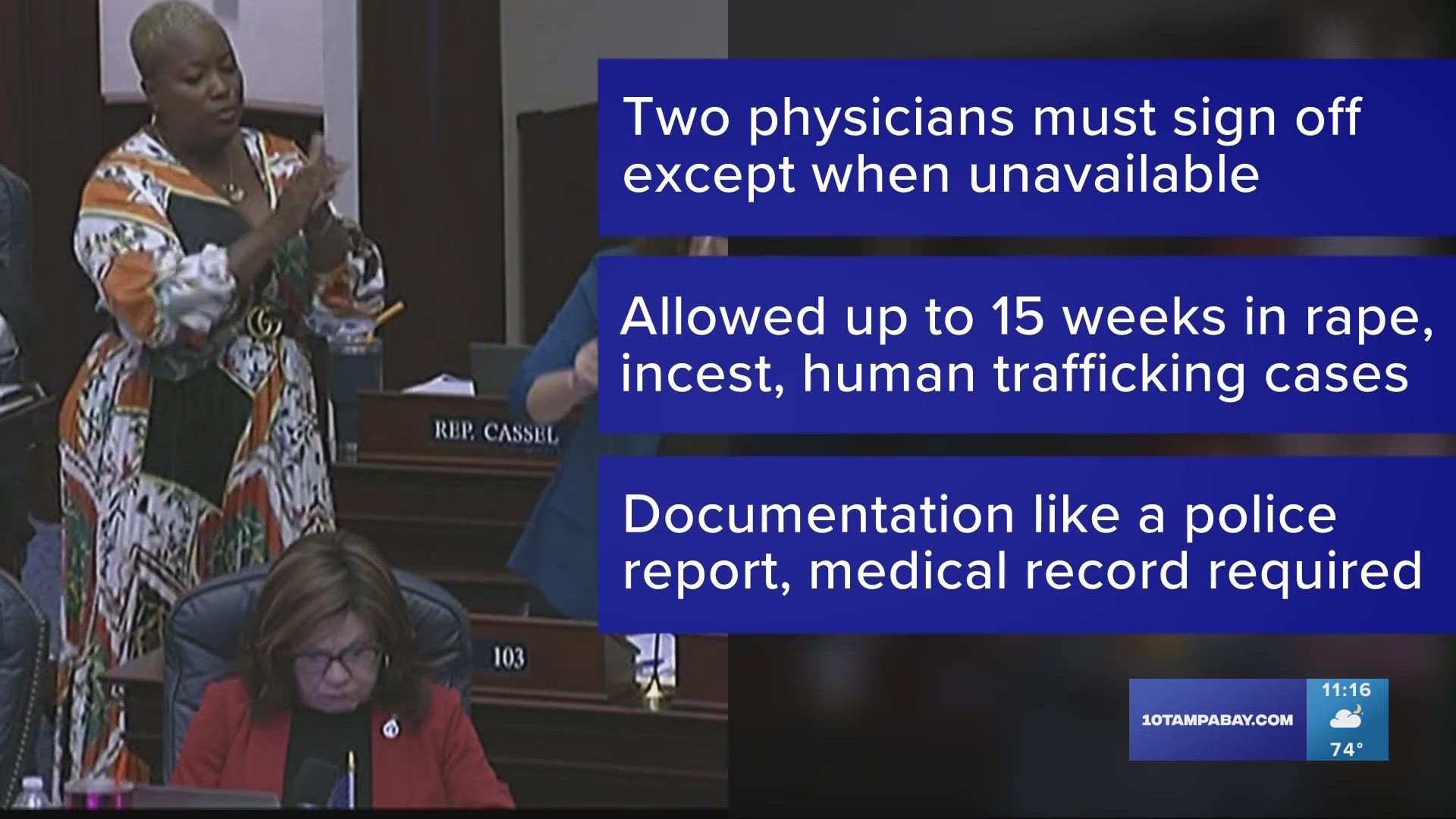TALLAHASSEE, Fla. — After Florida House lawmakers on Thursday passed a controversial bill effectively banning abortions after six weeks, it was sent to Gov. Ron DeSantis' desk for his signature.
DeSantis went on to sign the bill, dubbed the "Heartbeat Protection Act," into law late the same evening without prior announcement.
"We are proud to support life and family in the state of Florida,” DeSantis said in a statement. "I applaud the Legislature for passing the Heartbeat Protection Act that expands pro-life protections and provides additional resources for young mothers and families."
Senate Bill 300, dubbed the “Heartbeat Protection Act” during the legislative session, would prohibit doctors from performing abortions after six weeks of pregnancy — with exceptions only in cases of rape, incest or human trafficking up to 15 weeks of pregnancy.
In those cases, the woman would have to provide documentation such as a medical record, restraining order or police report.
Medically necessary exceptions are also included. At any point in the pregnancy, two physicians must sign a document attesting to the need for an abortion in order to protect the life and well-being of the mother. In some cases where a second physician is unavailable, one physician's approval is adequate.
“For decades now, Florida has been a nationwide leader in defending the rights of the unborn. The Heartbeat Protection Act will make Florida a beacon of hope for those who understand that life is sacred and must be protected,” Republican Sen. Erin Grall said in a previous statement.
The bill will also enforce a 24-hour waiting period as well as a ban on the use of telehealth in abortion services.
The prompt vote on the legislation on Thursday sends the measure to DeSantis. The governor, a potential 2024 presidential candidate, has said that he'll back the proposed ban.
Opponents argue the bill would give little to no time to arrange an abortion as six weeks is before many women even know they're pregnant. They say it would also create additional barriers for women living in rural areas with limited access to health care.
"After Ron DeSantis signed an abortion ban with no exceptions for rape, incest, or human trafficking last year, this new more extreme ban will outlaw abortion before most women even know they are pregnant," Florida Democratic Party Chair Nikki Fried said in a statement. "We’re already hearing the stories of how the ban DeSantis signed last year is endangering the lives of women in Florida.
"But Ron DeSantis cares more about appeasing the most far-right faction of his base for his self-serving political aspirations than he does about the women and girls who will face even greater risks once he signs this more extreme ban."
The proposal has also garnered nationwide attention, including from the Biden administration.
“This ban would prevent four million Florida women of reproductive age from accessing abortion care after six weeks — before many women even know they’re pregnant," White House press secretary Karine Jean-Pierre said in a statement issued after Thursday's vote. "This ban would also impact the nearly 15 million women of reproductive age who live in abortion-banning states throughout the South, many of whom have previously relied on travel to Florida as an option to access care.”
The future of this legislation also depends on the Florida Supreme Court's ruling on a challenge to current Florida law, which allows abortions up to 15 weeks of pregnancy. Justices will determine whether the 15-week limit violates a privacy clause in the state's constitution that has helped protect abortion rights in Florida for more than three decades.
This six-week limit more closely aligns Florida with the abortion restrictions of other Republican-controlled states like Texas and gives DeSantis a political win on an issue important to GOP primary voters ahead of his potential White House run.
It also has larger implications for abortion access throughout the South, as the nearby states of Alabama, Louisiana and Mississippi prohibit the procedure at all stages of pregnancy and Georgia bans it after cardiac activity can be detected.
The Associated Press contributed to this report.

